#essay structures
Explore tagged Tumblr posts
Text
#Hnd assignment help#essay typer#essay structures#essay help#essay writer#essay writing help uk#essay writing services uk
0 notes
Text
Les Mis Hidden Name Meanings: "Fantine"
Every character's name in Les Mis is either an elaborate pun or has some deeper symbolic thematic meaning — usually both at once.
One example of this is “Fantine.” There’s a wealth of hidden meaning packed into to her name, and some of those meanings are explicitly discussed in the original novel.
The name “Fantine” comes from the french word “enfantine,” meaning “childike, infant-like.” Her name basically means “Baby.” And obviously this speaks to her innocence and naivety. But also “baby” is kind of,.,, well, it sounds more like an informal term of endearment than an actual legal name?
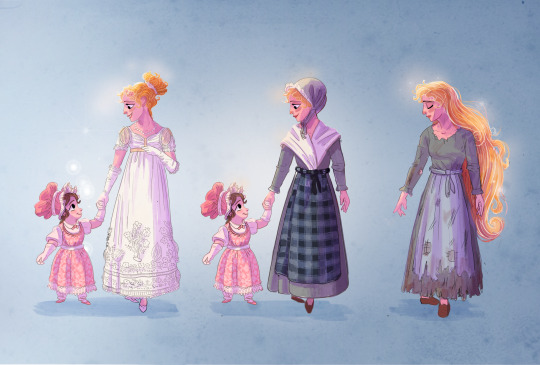
And that’s because– Plot twist– Fantine isn’t her legal name!
What is her legal name? She doesn’t have one.
And the reason she doesn’t have one is directly tied to political turmoil of the era she was born into.
Fantine grew up an orphan living on the streets, without a family without parents. Hugo tells us the origin of her name:
“She bore on her brow the sign of the anonymous and the unknown. (...)She was called Fantine. Why Fantine? She had never borne any other name. At the epoch of her birth the Directory still existed. She had no family name; she had no family; no baptismal name; the Church no longer existed. She bore the name which pleased the first random passer-by, who had encountered her, when a very small child, running bare-legged in the street. She received the name as she received the water from the clouds upon her brow when it rained. “
This moment is adapted beautifully in the Manga adaptation by Takahiro Arai:
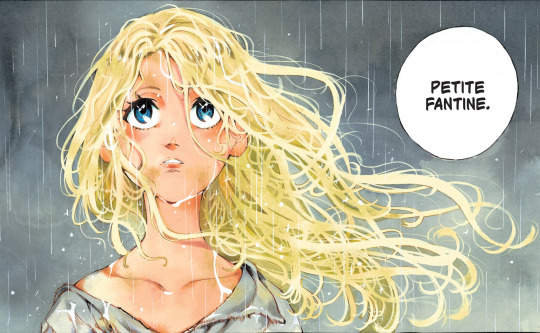

But now let’s talk about the Directory.
To wildly oversimplifly a lot of complex history: Before the French Revolution, the Catholic Church’s records of baptismal ceremonies were often used as a registry of people’s legal names. During the French Revolution, the Revolutionary government– including the Directory– put in place a series of policies we now call “dechristianization,” where they attempted to dismantle the power of the Catholic church.
Fantine was born during the age of these dechristianization policies. So she was likely never baptised, her baptismal name was never recorded, and so she has no documented legal or family name. She’s slipped through the cracks of the legal system, and ended up completely anonymous.
This sets Fantine up as this anonymous child of the Revolution– a stand-in for everyone who was left behind when the Revolution was left behind, and kings were restored to the throne.
Fantine’s namelessness is meant to show her isolation. She has NO support system. She has nothing to connect her to other people, nothing to connect her to a support system.
Finally, the way Fantine tends to “slip through the cracks” is something that follows her throughout her life. When she’s fired from her job at a factory, Mayor Madeleine never learns of it– Fantine has this tendency to be overlooked and forgotten in official records. At the end of the story, she is buried in an unmarked grave, with not even the name “Fantine” on her headstone. She is born anonymous and she dies anonymous.
It ties into the novel’s questions about which people we consider worth remembering, whose lives are worth being recorded.
[Thank you for reading! This essay was originally posted as a video here. For more Les Mis talk, you should subscribe to the 2025 @lesmisletters readalong on Substack here, and join the BrickClub Discord server here!]
#les mis#les mis letters#fantine#les mis hidden name meanings series#les mis tiktoks#:'3#I'm reposting my stuff from Tiktok in Tumblr Grammar!!#It's an Official Essay.#Anyway#this is far more Structured and Polished than my usual nonsense#hope you guys enjoy it!!#I'm gonna bring the Valjean one over.
456 notes
·
View notes
Text
every hbomberguy video essay about a video game he likes: this game is overwhelming, obtuse, and difficult. it lies to you and will kill you out of the blue and the secret ending will actually poison your hometown's water supply. isn't that great!
me (unironically) : oh my god yeah, what incredible game design
212 notes
·
View notes
Text
i get it jayvik should've kissed this and that but this is a win specifically for me, aro, #1 believer in "so devoted that the lines blur"
#LIKE. i truly do get it. i promise i do. i 100% promise. but once i wrote a line in an essay about how like#non-aro ppl will never know what it feels like to have representation taken away at every corner. because platonic relationships can b#dismissive or not representative of the relationships that aro ppl have. that profound and large space and spectrum. and bc romantic#relationships do the same in the opposite way. do not put us in boxes. esp those we've opted out of. jayvik do it like me (reject romance)#(and make our own structures of love not based on society or what it wants. this makes logical sense with them litchrally universe melding#too. like. HELLO. THE FOREHEAD TOUCH. THAT IS SO SPECIAL TO ME!!!!)#jayvik#arcane#arcane spoilers#arcane s2 spoilers#arcane s2#viktor#viktor arcane#jayce talis#jayce arcane#aromantic#arospec
88 notes
·
View notes
Text
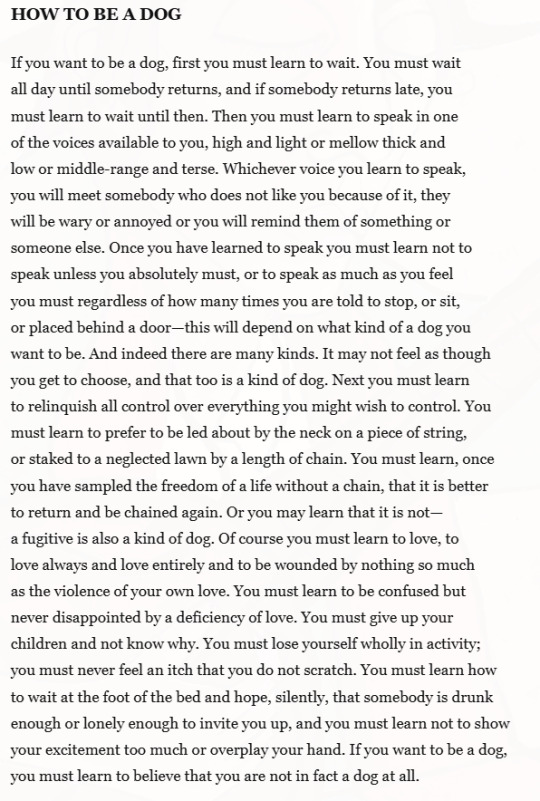
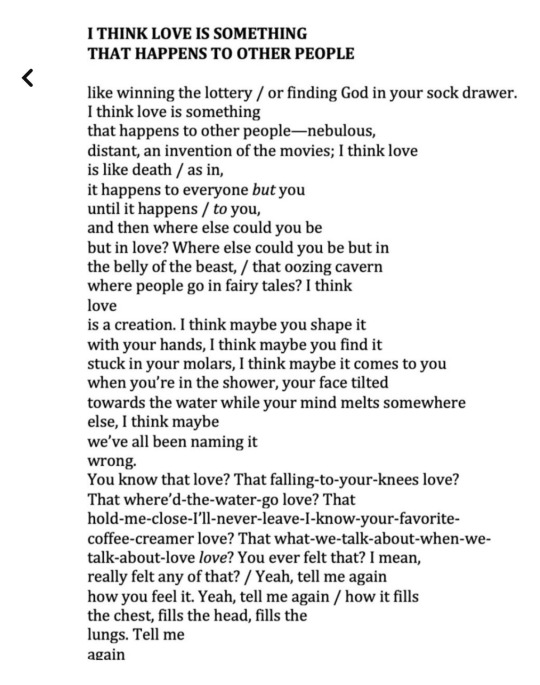
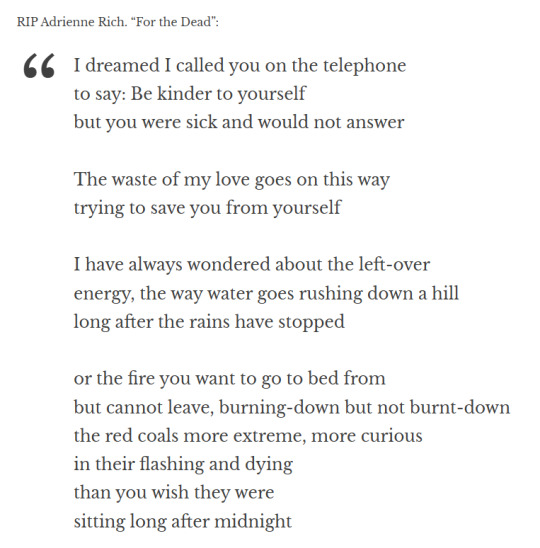
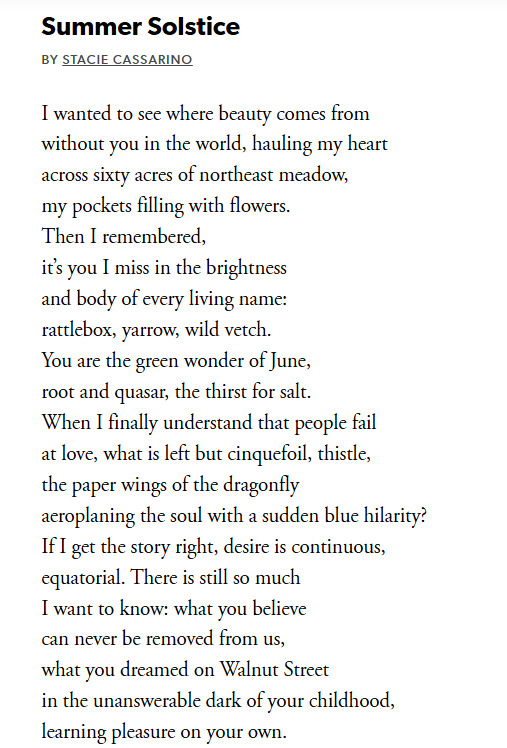
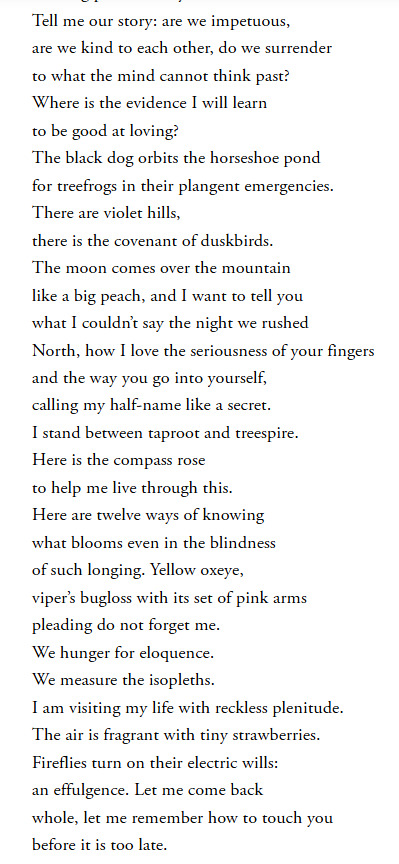
recommendations for @mail-me-a-snail & honestly everyone who follows me bc y'all know i give out recommendations like candy. i think especially you may like I think love is something that happens to other people and HOW TO BE A DOG (the latter is similar to Your Faithful Servant).
#zoneposting#poetry#some recommendations#my followers know ive never been normal or calm about poetry ever#oh god i forgot to update you guys that i recently won a 2k grant to establish a 3 year program to teach poetry to kids thru my poetry org#i wanna post some of the poems im gonna use esp since lots are in spanish/by latino authors#reminder to do that#n e ways i have so much more but im showing restraint (rattles the bars of my cage)#how to be a dog is rly similar to your faithful servant in structure and theme and actually i fear im composing a small essay abt it.#ALSO it is absolutely okay if none of these vibe with you--poetry is incredibly subjective & i passed over some of my favs to rec these#sometimes what rewrites one person is just words to another and that is more than alright#but i wanted to try to return the favor bc im adding your faithful servant to my poetry doc bc it honestly hit me spectacularly hard#& im very glad you decided to post it
81 notes
·
View notes
Text
also i passed literally all my midterms with flying colors (basically A+'s if grad school did A+'s) (or gold star stickers if grad school did gold star stickers)
(they should)
and all my midterms were just essays and all my professors who graded my essays said my essays were very well-written and well-structured and had high readability
and im like thank you thank you i've written like a million words of porn for the internet. i know my adjective noun verb placement very well
#kit to kit#its not not a humble brag#im just best in my class in 3/4 classes#so i cant humble brag to my classmates lmao#but also i always love when professors or academics say i write well#like of course i do ive been practicing nonstop for literally 4 years#'can i structure a 1000 word essay' i can structure a 50k wip
87 notes
·
View notes
Text
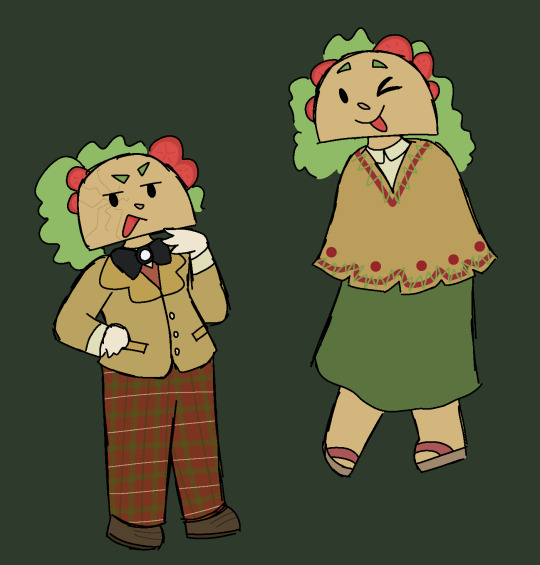
it’s raining tacos????? idk man what do you want from me?
making up new awesome non-au related gijinkas… (was originally gonna digitalise all of them but i got lazy lol)
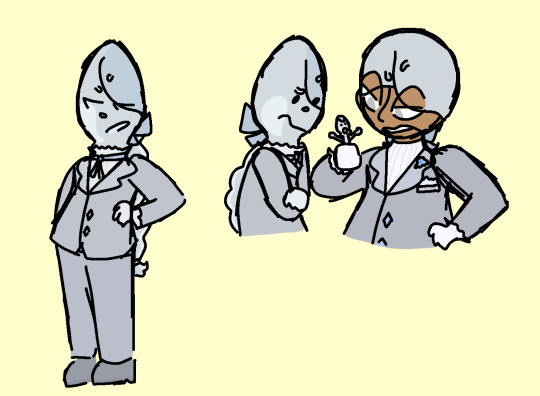








apple is definetly my favourite to draw right now lol
#yeah this is some pretty lazy stuff compared to my other art posts but in my defence i have more important things to worry about (prelims)#there is no WAY i am getting any marks on my section three essay. i don’t know why i decided not to look over that essay structure since i—#—already knew i suck at it but what’s happened has happened. at least this is only prelims!#also i reallyyy don’t like the teacher in charge of exams. like what do you MEAN ‚you have to arrive at quarter past’?? what happened to—#‚you have to be fifteen minutes early at a MINIMUM’???? and i had already been half an hour early for my other exams?????#like i always arrive so early. in the english prelim the invigilator was SO shocked like ‚well looks like SOMEONS got here early! :D’#ok ok that’s enough yapping. TAGS#ii taco#ii silver spoon#ii salt#ii pepper#ii marshmallow#ii apple#ii bow#ii knife#ii box#ii suitcase#ii goo#inanimate insanity#ii
37 notes
·
View notes
Text
Realistically speaking, in a Hunger Games Stranger Things au, Jonathan Byers would be Katniss Everdeen.
#i am 100% serious#i could write am emtire essay but basically#their family structure is the same#will and prim are the same#and jonathan would volunteer as tribute if will was ever picked for the hunger games#both have prickly exteriors and struggle making friends#and nancy could make a decent peeta they are both financially better off and have families that are distant with each other#nancy is also a good strategist#hopper is haymitch especially when it comes to father figures with katniss and jonathan#anyway if u guys want to hear more about this or qant clarification i can give it#like theu arent the exact same but jonathan is the closest to katniss u can get in the st universe#jonathan byers#stranger things#katniss everdeen#jancy#everlark#byler#< target audience
548 notes
·
View notes
Text

You know what, fuck it, I have to speak my truth! (this is gonna be a rant, so anyone who actually likes assassin's creed revelations and/or the secret crusade, be warned or maybe don't read this at all)
remember how altaïr talks to king richard at the end of ac1, and richard is like "[humans] come into the world kicking and screaming, violent and unstable. it is what we are. we cannot help ourselves."? and how altaïr answers "no. we are what we choose to be." and how that ACTUALLY has meaning bc he himself was "violent and unstable" at the beginning of the game but he has learned and is now CHOOSING to be a better person who cares about others and humanity at large? remember how his calmness and gentleness was something that he ACQUIRED over the course of the story?
and remember how in revelations they then suddenly had a PRE-AC1 altaïr say about the first of his targets "no man should pass from this world without knowing some kindness." and be all wise and calm and collected during a nice little chat with al mualim, who suddenly acts all fatherly? (like, this is suddenly supposed to be a positive relationship? what??)
also, during the confession the target says to altair: "you put too much faith in the hearts of men, altaïr. [...] humans are weak, base, and petty." and altaïr answers: "no. our creed is evidence to the contrary." KJASJFJDKL???? like, it’s almost insulting how close this exchange is to the one with richard. you know, the one that was actually earned after a whole game of character development. like WTF??? cool congrats now that development means nothing. like, apparently that was just altaïr reverting BACK to being the exemplary assassin who understands and believes in the creed that he was apparently just born as. (i also hate how having a young inexperienced altaïr saying this implies that altaïr's faith in humanity is a sign of naivete instead of a sign of the wisdom he has gained after being confronted with counter arguments for a whole game, and also something that distinguishes the assassins from the templars who use humanity's supposed wickedness to justify controlling them like in AC1, but whatever)
altaïr’s development in AC1 mattered BECAUSE he is not NATURALLY a good person, it actually said something about humanity's capacity for both bad AND good and how humans don't have to be forced to be good through mind control bc they can by their own free will choose to be better when taught how and when allowed the freedom to grow. but no. apparently altaïr has just always been calm, wise and gentle. and he just sort of forgot about that during AC1 bc…. ? bc of adha?? bc of abbas???
oh don’t get me started on the whole abbas thing. (it doesnt even make sense that abbas is so hung up about his father and "his family’s honor", like what about the whole point of al mualim not allowing parents to be close to their children bc it would make them weak? like, my dude, you’re not supposed to HAVE any family aside from the brotherhood)
they used the throwaway character that had like 5 lines and made him into altaïr’s main antagonist in revelations… like, abbas wasn’t supposed to be this ONE dude who had personal beef with altaïr, he was just supposed to show how while altaïr’s revered by many, a lot of his brothers also hate him, bc 1) altaïr is a shitty person at this point and 2) bc there’s no real feeling of community and family in this version of the brotherhood, but just a pervasive sense of competition and jealousy — these assassins don’t care about their goal of safeguarding humanity bc they’re too hung up on petty squabbles and divided by rivalries (you know, the things that made malik hate altaïr even before solomon’s temple and that he overcomes in the end which enables him to forgive and to reconcile with altaïr so they can work together and stop al mualim? (you ever just think about "we are one. as we share the glory of our victories, so too should we share the pain of our defeat. in this way we grow closer. we grow stronger." and cry? bc i do. all the time. malik, the man that you are))
and now abbas is altaïr’s childhood best friend turned lifelong enemy?? like, bowden bent over backwards to come up with an explanation for why altaïr is an arrogant ass at the beginning of AC1, when the explanation is right there: he was raised to kill without asking questions and was constantly praised for how good he is at murder, which resulted in him becoming arrogant and disregarding human life. like, it doesn’t have to be some shakespearean family feud type shit. and guess what, this "simple" explanation actually plays into the story’s themes, who’da thunk!
(like, abbas might not have been a "fleshed out" character in AC1, but he had a specific function and now that function is gone. mr bowden, mr mcdevitt, you know characters are allowed to simply exist to tell us something about their worlds and the systems they live in and sometimes that’s more important and also more interesting than having every single character have a detailed backstory to explain all their behaviors, right?)
with all of this revelations loses all nuance in regards to the levantine brotherhood and also the creed in general. like, altaïr being a master assassin at the beginning despite being a terrible person and not actually understanding the creed is a criticism of the brotherhood and the creed itself. like, it said something about the order that someone like altaïr was able to get that high in rank, simply bc he's good at killing, which also tells us what is considered important in the al mualim era assassin order. when you make altaïr’s arrogance the result of his personal conflicts instead of how we was raised by a brotherhood that only valued one's ability to kill, you lose that characterization of the assassin order itself!
and by suddenly making al mualim a semi good "father figure" you also downplay his manipulation of not only altaïr but all those under his care. (altaïr says something about al mualim being "as a father" to him exactly twice in the codex, but he doesn’t mean by that that he WAS a father to him, what he means is that he was the CLOSEST THING he had bc HE DID NOT HAVE PARENTS, not because his mother died in childbirth and his father was executed when he was young btw, BUT BECAUSE IT WASN’T ALLOWED, like his parents actually lived but weren’t allowed to be close to him, he says he came to view al mualim’s "weak and dishonest" love as enough and even better BECAUSE HE HAD NOTHING ELSE, BECAUSE AL MUALIM ISOLATED HIS ASSASSINS FROM THEIR FAMILIES. al mualim "loved" him bc he was good at killing people for him! hm, i wonder if this could be trying to say anything about cults and indoctrination and the inherent contradiction in fighting for peace and free will by taking children away from their parents and raising them to become killers?? like, altaïr wasn't ~the special orphan boy~ taken in by al mualim bc his father died a hero's death, it was "the way of the order" to have al mualim be the closest thing to a parental figure for everyone to ensure absolute loyalty! altaïr saying al mualim was like his father is not supposed to make you go "oh, he must have actually been a good guy for altaïr to consider him a father", it should make you go "oh that's kinda fucked up that he considers the dude who made him into a killing machine and who manipulated him a sort of father figure"!)
and then in revelations they suddenly portray that relationship as positive and healthy??? like, it would be one thing to give it some nuance by delving into the psychology behind al mualim’s "love" and maybe showing how al mualim did care about altair in a complicated, fraught sort of way (like, you know, there’s a lot of interesting things you could say about al mualim at several points addressing altaïr as "my child" in AC1 and how that parallels Garnier referring to the people he drugged and abused as his "children", and what that says about how the templars view the people who they say they want to save and in whose best interests they supposedly act (in any case, al mualim doesn’t use that phrase because he has any real parental feelings but rather to patronize and to invalidate any objections, like in a "mother knows best" way))
but they even fucking DARE to parallel that relationship with that of altaïr and darim in revelations, by having the reflection in the puddle of darim hugging altaïr showing altaïr hugging al mualim…. like their relationship wasn’t inherently abusive but just tragically cut short because al mualim was just "corrupted by the apple"… like WHAT???? so it’s not the very real problems like grooming, manipulation and indoctrination and the hierarchical structure of the brotherhood itself (all of which are antithetical to the assassin ideology), it was just the evil apple all along. great. that’s DEFINITELY a lot more interesting.
god im sorry i really dont want to spread negativity but this is driving me INSANE. like, somebody please tell me im not crazy bc i feel like somehow most of the fandom is in agreement that revelations and the secret crusade have better storytelling and characterization than ac1.
SPEAKING OF WHICH, can we talk about how, even IF we completely ignore AC1 and treat revelations altaïr as his own character…. the narrative still doesn’t really work?
basically, the whole point of his story in rev is that "he gave his whole life to the brotherhood", this obsession led to him not using his time with his family which has him ending up dying alone in a dark library and this in turn makes ezio reevaluate his life choices…. except. he doesn’t? neglect? his family? or whatever? like, his devotion to the assassins is sort of painted as this tragic flaw that leads to a lonely death bc it supposedly comes at the cost of his family, but… his wife has joined the assassins, (at least) one of his sons is in the brotherhood and even when he goes to protect the assassins against the mongols, he takes his family with him (except for the son who stays behind bc he has a family of his own and who, ironically, ends up dying bc of that)… like, you can’t describe altaïr as a good husband and father in the database and have his son tell him that "everything that is good in me began with you, father" when they say goodbye, and then want to make us believe that he put his family behind the brotherhood and that that is a character flaw that leads to his tragedy.
because you HAVE to have a character’s tragedy be the result of a character flaw. like. that is how tragedies work. otherwise it just becomes tragedy for the sake of tragedy which is… boring bc it has no purpose. and we know it is SUPPOSED to have purpose bc ezIO FUCKING QUITS BEING AN ASSASSIN AFTER WITNESSING IT!
it’s like they want to have their cake and eat it, too — they didn’t want to actually make altaïr a bad husband/father, but still wanted to make his life a tragedy where he loses his family which is why instead they outsource all responsibility to abbas who now has to be the reason for ALL the deaths.
like, they try to make at least maria’s death kind of sort of the result of altaïr’s rashness or whatever but like… these guys KILLED THEIR SON and TOLD HIM THAT ALTAÏR HAD ORDERED HIS DEATH. like, altaïr losing it in response to that is not rash, it’s fucking logical and justified! if anything the scene made me angry at maria for trying to stop him. like, GIRL, he was YOUR son too??? but god forbid we give female characters actual real emotions, she has to fill the role of "voice of reason who dies for altaïr’s man pain" i fucking guess.
like, it’s this weird mix where his tragedy is simultaneously painted as his own fault but also not really bc abbas is the one responsible for all the shit that happens. it just… it just doesn’t really go together.
the only way to make his story make sense narratively and to give it actual purpose is by looking at it in the context of ezio’s story, bc the things he sees in altaïr’s memories are supposed to be a revelation (ha!) to ezio specifically. and i guess that’s maybe the crux of it all — altaïr’s story in revelations was conceived of first and foremost to support ezio’s story and development. which is probably also why many people maybe don’t notice bc, having skipped ac1 and started with ac2, the majority of people mostly care only about ezio and only really appreciate altaïr’s story in as far as it serves to push ezio forward. (tho i’ve also seen a few people say that ezio is also written kind of weird in rev, but i’ve never really been an ezio girly myself so i can’t speak to the truth of that)
like, altaïr dying alone in the library doesn’t really have to make sense for his character, i guess, bc it’s only really supposed to be a cautionary tale for ezio.
so, i guess, for once, they actually had a MAN dying for another man’s character development, which is pretty woke actually. ubisoft, i take everything back jksdsfjhgdsahfhsdhfghfdsgjhsdgjh
#assassins creed#ac1#altair ibn la'ahad#malik al-sayf#ezio auditore#asscreed#rant#long post#this is killing me#i even started rereading the secret crusade bc i thought maybe i remember it being worse than it is#but honestly its the opposite#even just the fact that in the secret crusade altair always says some last sentence after his targets' confessions#has me so irrationally angry aksjdfh#like over sibrands body he says something like 'may death be merciful' or something#like? did they want that to be like requiescat in pace or something???#like aside from the fact that altair WOULD NOT FUCKING SAY THESE THINGS#it also just destroys the tension built up by the target's last words#like... i do think it was very much on purpose that the target always had the last word in the confessions#sigh whatever its just a stupid video game from over 15 years ago who cares#(me. i care. unfortunately. i wish i didn't. send help please.)#also the fact that bowden just completely fucked up arabic naming conventions with the whole “umar/darim ibn la'ahad” thing#(which is kind of an achievement considering that wasn't too great in ac1 to begin with)#tho bc of that they kind of inadvertantly ended up implying that roshan is altairs ancestor which i actually kind of like lol#anyways sorry for this giant wall of text#this is probably (definitely) the longest post i've ever made lmsadjf#but i do think i've gotten most of it off my chest.... maybe#maybe ill add stuff if i come across something else that makes me angry lol#sorry i know i promised an essay and instead delivered a rant#i just dont think i have the capacity to actually structure my thoughts any better kajdsf
140 notes
·
View notes
Text
So I spent a lot of time analyzing Barok and Albert's dynamic, coming to the conclusion that they are in every way inversions of one another. However, there is exactly one point they agree on: They value their work over their own lives.
For Barok this is best showcased by his conversation with Ryunosuke on how his persona as The Reaper of the Bailey has led to multiple attempts on his life:
Van Zieks: I mean to say that if my pseudonym serves a useful purpose... I adopt it gladly, and with honour. Ryunosuke: But it's putting you in danger! You could be killed! Van Zieks: If that is my fate, let God decide.
Meanwhile for Albert, this is established during his trial. He very calmly asks Ryunosuke to stop defending him, launches into a confession, and promises to co-operate with whatever the prosecution wants all the while begging Barok is protect his creation. He later outright states that being declared a fraud "Would have been a fate worse than death for [him]."
From a broader perspective these seem the same. Barok calls it an honor to be labeled the Reaper- superseding the threat to his life; Albert's entire arc centers around his prioritization of his career over his own life. Except, the method that they use to reach that conclusion is inverted.
To Barok, because his work provides value, it does not matter if it kills him. Albert would rather die than for his work to lose its value.
My point here is both: Wow. These men desperately need therapy, but they're from ace attorney so we already knew that. And Also, I feel this exemplifies their entire dynamic. Even the one singular point that I found they overlapped on (aside from being equally weird about each other), they still reach that point in opposite directions.
#Neither of these men have a healthy work-life balance. someone get them some self preservation stat#ace attorney#tgaa#barok van zieks#albert harebrayne#welcome to bonus thing I noticed while writing that Albert Essay#that I could not for the life of me find a way to fit into the overall structure
50 notes
·
View notes
Text
"Always Watching": an Analysis of Obito's Afterlife as Horror
In chapter 687 of the Naruto manga, Uchiha Obito dies. Chapters 687 and 688 contain a scene wherein he meets with his old friend (and love interest) Nohara Rin in the afterlife.
This is a touching scene, right? One would think so. The problem is that for some reason it's actually really fucking scary. In this analysis, I'm going to explain why the moment is framed in such an unsettling matter, and what that means in terms of the story.
First off, I'd like to establish a disconnect from the intent of the scene. Naruto, as a narrative, often tells the reader things that contradict the events shown, both in terms of tone and action. This scene is a contradiction on both accounts, as is common when Nohara Rin is the focus of any scrutiny. This dissonance results from the fact that although Rin is said to be kind, intellectual, and devoted, we see very little evidence for this being the case, and in some chapters, evidence to the contrary. This contrast is a key tool in reading this scene as horror.
This contrast is not a function of good writing- rather, it is a result of Kishimoto's failure to fully flesh out his female characters. I am aware that this scene was not written with the intent of being horror- I am simply arguing that it can be read that way, anyways.
I would also like to acknowledge the fact that a reading of this scene wherein Obito is not talking to the real Rin is a perfectly viable take in the context of this scene as horror. It can even amplify it in some cases- however, whether or not the real Rin is guiding Obito to the afterlife is not the topic I intend to tackle today.
Finally, before we get into a close reading of this scene, I would like to define horror, and discuss why a reading of this scene as horror can be meaningful. I will be defining horror as "storytelling that invokes fear or otherwise uncomfortable emotions through the employment of distressing imagery or engagement with upsetting subject matter." I intend to prove that this scene can be read as horror by emphasizing the "distressing imagery" and "upsetting subject matter" present in it, primarily through contrast.
Horror is important because it challenges our notions of normality and appropriateness. By reading this scene as horror, we are forced to question the morality of Obito's actions, the accuracy of Obito's views of Rin, the necessity of Obito's sacrifice, and many other aspects of the Naruto narrative.
To begin with: Obito takes Kaguya's All-Killing Ash Bone attack to save the lives of Team 7 We are treated to a short flashback of Rin encouraging Obito to become hokage and vowing to stay by his side as he does so. We then transition back to the present, where Obito tells Naruto to become hokage. He then dies- Kaguya and Zestu mock him, Naruto defends him, and Obito wakes up in the afterlife.
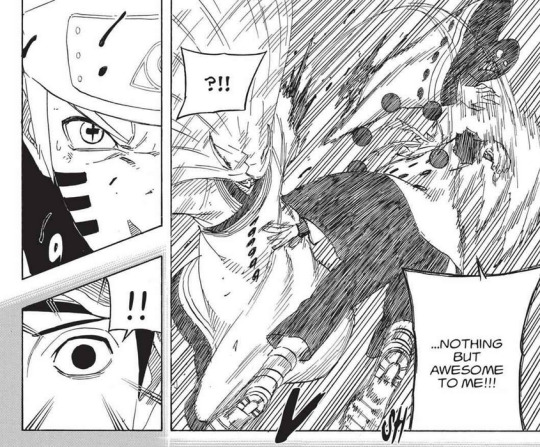
The first panel of the sequence is the extreme close-up on Obito's normal eye- this serves to establish the fact that he does not have his sharingan here. He is powerless, and therefore vulnerable. The shock and sudden scene transition also serves as a jolt to readers, destabilizing them as they enter the scene. We also see the grey border that surrounds the scene begin- this grey border helps to establish the surreality of the scene. In the Naruto manga, pages taking place in the present are surrounded by white and flashbacks are surrounded by black. By shading the area around the panels light grey, an in-between area is established. The liminal quality to this scene further unsettles the reader and contributes to a horror reading.
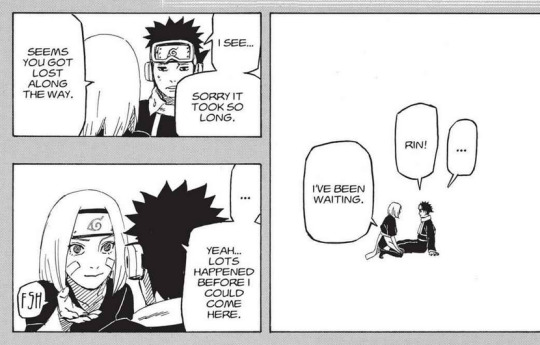
Next, the scene goes from incredibly close to distant. Contrast is one of the most important pieces of imagery this scene uses to unsettle the reader. We see this contrast again in the next panel, as Rin and Obito take turns facing the camera. The scene also plays on Obito's vulnerability to discomfit the reader. Obito has been thrust back into his childhood body. He is much weaker than he has been in a long time. Rin is not sitting neutrally- she is leaning into Obito's personal space, pressing in and creating an oppressive atmosphere.
The dialogue in this scene also serves to unsettle the reader. Obito pauses unnaturally twice in three panels, and Rin's dialogue is chilling. The first thing she says to him is "I've been waiting." Taken on it's own, it's far from comforting, or even romantic. The ominous tone of the dialogue contrasted with Rin's tranquil smile creates horror.
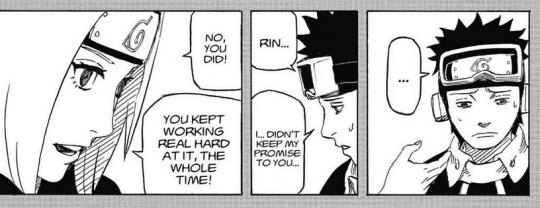
The expressions in these panels work to communicate Obito's (justified) distress over his actions. Rin's expression, in contrast, is oddly unaffected. The lack of reaction to any of the people Obito hurt contrasts with the picture of a kind girl that Obito and Kakashi's memories have presented us with thusfar. It creates horror, and challenges both Rin and the position of hokage as ideals.
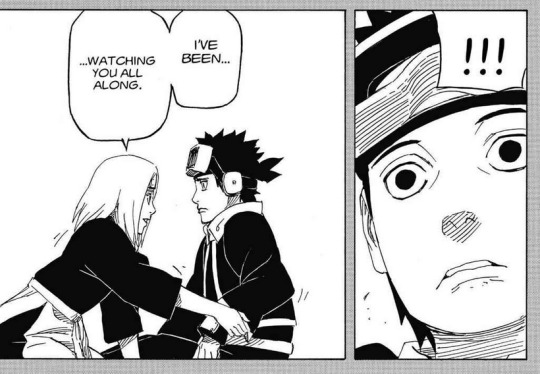
Rin's expression and the cadence with which she delivers her judgement are unsettling. The unnatural pause in the middle of her dialogue emphasizes the horror of such a statement- "I've been... watching you all along." Directly following her declaration of Obito's innocence, this throws the lens of morality the narrative of Naruto has been asking us to use into question. It also. Hold on a second can I stop essay talking for a little bit ahem. It's just fucking creepy? Like that's not a normal thing to say why'd she say that. Why's she pause in the middle of it. It's so threatening for no reason??? It's the panel that inspired this piece because when I was reading this chapter for this first time I had to go back and check to make sure I was getting the intention of it right because this reads like fucked up nightmare fuel scene!!! Forget wrangling something into a shape it's not meant to be in you have to squint to see this scene in a non-horror light!!!! Why. Literally why. Okay anyways ahem Paired alongside Obito's distress and Rin's clear invasion of his personal space, this is easy to read as horror.
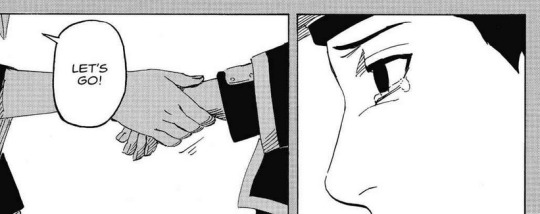
Once again, we are shown an extreme close-up of Obito's eyes, emphasizing his distress. We also focus on Rin's grip on Obito- notice how it's not reciprocated. The close view of her hold on his hand suffocates the reader, signalling that something is wrong.
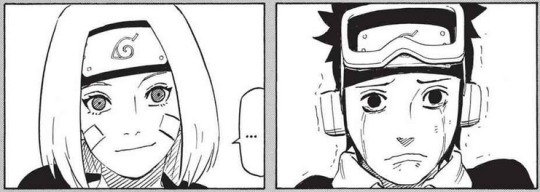
Here we see more contrast to build uneasiness- the difference between Obito's anguish and Rin's unflinching smile casts doubt on the sincerity of Rin's smile, and therefore on the basis of her character.

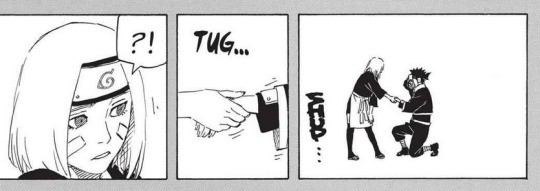
Once again, the framing of this scene pulls attention towards Rin's grip on Obito. We also see juxtaposition between close-ups and distant framing of panels. The movement of our view creates a sense of unease, not allowing us to sit comfortably with any perspective. We also see Rin shift from a smile to concern for the first time- and it's only because Obito is trying to resist (and failing) to resist her grip.
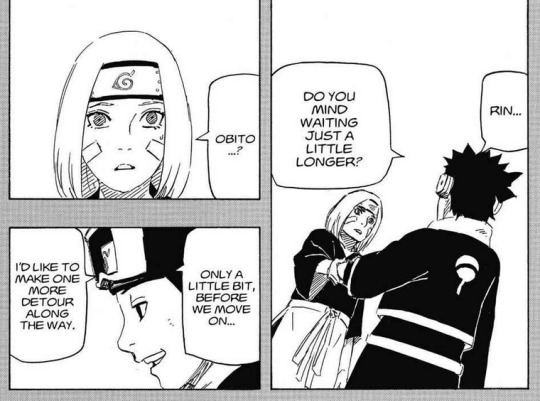
Finally, the contrast is reversed. Now we have Obito smiling and Rin not. Rin is still holding Obito, but the tension between them isn't as great. They are both on their feet, lessening the power imbalance between them.
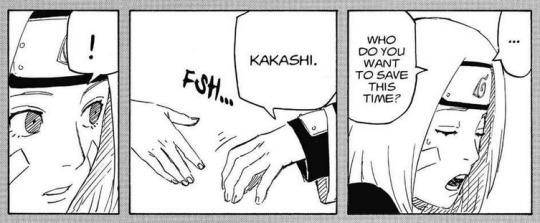
Finally, with Obito's denial of Rin, we see something beyond a plastic smile or concern. She releases his hand, and seemingly becoming more genuine, the undertones of horror begin to fade.

With the direct mention of Kakashi, things clear up even more. Obito's dialogue is more natural, and although we still have the framework of distant/close up perspective, it's less extreme. Rin and Obito are on even terms- or, so it seems. The horror in the earlier scenes came from the fact that Rin was leading the conversation, and was behaving in ways that felt wrong. Now that Obito is leading, Rin doesn't have the opportunity to exorcise agency and therefore contradict the characterization she supposed to have. Although the horror is fading, it has not been resolved. It is merely being covered up.

I'll stray into another framework I like to use to analyze Rin scenes, here- I've suggested in the past that the sincerity of Rin's character at any given moment can be read in a symbolic manner based on her eyes. Closed eyes represent deceit- in these panels, Rin conforms exactly to Obito's expectations of her, smiling with her eyes closed and bearing a striking resemblance to the photo of team Minato we often see as representative of Kakashi's grief for Rin and Obito's goals. She has regressed to an ideal; the horror is gone. Their expressions are no longer contrasting in an uncomfortable manner, instead complimenting each other, and their dialogue has moved on from uncomfortable phrasing into natural bickering. And yet, because of this resolution- this surrender- Rin becomes a liar, once again conforming to other's visions of her rather than expressing her true feelings.
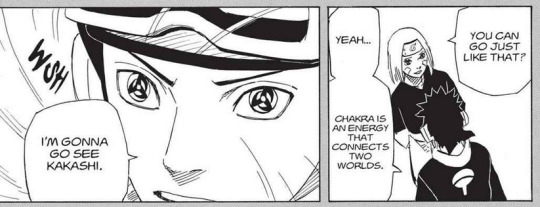
Here, Obito reactivates his sharingan, marking a reversal of the dynamic. He is stronger than Rin, now, and conforming to a traditional Naruto value (self-sacrifice as an unarguably positive force). Any concerns raised by the undertones of horror earlier have been completely brushed over.

Finally, we bookend the scene with Rin once again reiterating her "waiting." Rather than horrific this time, though, it is resigned. It is the kind of thing a kind, dutiful girl would say- she waits in the afterlife for Obito, expressing no agency. The perfect image of a perfect girl, in complete contrast to her unsettling behavior earlier.
Although the Naruto manga spends more time in Obito's afterlife, we won't see Rin again for a while, so I mark this as the end of this scene specifically.
We receive no resolution to this horror. The handful of Rin's appearances afterwards do not address her actions or the tone of the beginning of this scene.
In conclusion, Obito's afterlife effectively uses unsettling imagery and dialogue to build tension without ever releasing it. The horror that it invokes is never resolved, and this leaves the audience questioning the reality of the scene and other information connected to Obito, Rin, and Konoha as a whole. It can be read as horror in order to broaden understanding of Nohara Rin as a character and Obito's relationship to her.
#rin nohara#obito uchiha#obirin#maybe? idk im just a humble rin poster....#i <3 pseudo-academic tone... NO more essays instead i will be dumping thoughts into semi structured posts and not editing them. thanks.#NO CITATIONS!!! FUCK YOU!!! i made all this shit up theres no other scholars anyways.......#anyways lol. why DID kishimoto frame it like that
22 notes
·
View notes
Text
My wife (late twenties, humanist, historian, archivist) is proofreading my (late twenties, geographer, environmental scientist) research paper on my ethnology minor studies and she just came over to tell me that my structure is quote un quote "seriously fucking absurd" and I had to tell her that that's just how we do it. She's now trying her best to make it read a little bit more like a humanities paper. Godspeed, darling.
#every time someone gives advice on the internet on how to write a good essay and never specify any of their advice#I can just tell that they are an english major#if my wife ever turned in a paper that is structured like my papers she would get it back with a fat zero very quickly#as would I if I did so with how she is taught how to do it#history and geography are not even that far off from each other lmao#personal
31 notes
·
View notes
Text
i just know jai grew up super close with the garricks. mostly because he is an old man at heart.
#jai west#flashfam#jai ily baby. i have so many thoughts on the west twins for two characters who have very little solid characterization.#one day i will write my essay on the structure of flashfam relationships through the eyes of irey and jai
29 notes
·
View notes
Text
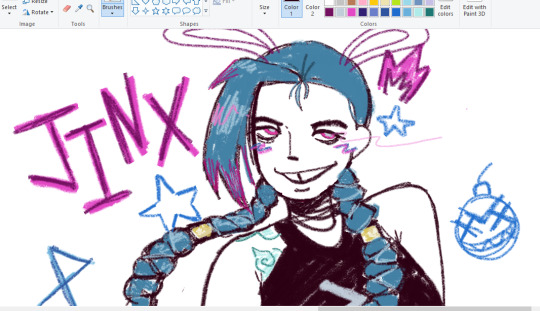
college apps beating my ass so i drew jinx to cope
#my art#doodle#arcane#jinx#jinx arcane#mspaint#i just have 1 more essay prompt but oml idk how to structure it#give me strength jinx
24 notes
·
View notes
Text
I usually read historical romances, but I've been branching into contemporaries more recently especially because I want to read more f/f and the offerings in the Regency/Victorian section are kind of grim. But I did pick up The Duke's Sister and I, a Regency-era f/f romance published by Harlequin (!) and while I am having a perfectly good time with it, something stood out to me about this particular book's target audience and who books are for in general.
First of all, I have gotten into the habit of coding romances while I read them because that's what I do for my academic work, and it's interesting to me that the protagonist dynamic in The Duke's Sister and I is clearly still rooted in the more traditional "he's a playboy and she's a virgin" setup that has gotten a bit less popular generally but was part of the submission guidelines for Harlequin/Mills & Boon until fairly recently: Charlotte has had lots of female lovers while Loretta doesn't even know that that's an option, and Charlotte is the one who will have to overcome her #issues to accept that love and happiness are even an option.
Secondly, this adds a bit of a twist to the usual arc of sexual awakening for the "heroine" but still echoes that exact dynamic: one character being the other's first ever sexual relationship, which means they are also the one to teach the "virgin" how sex and pleasure work. I am personally not a huge fan of this simply because I don't find that first unsure and often insecure exploration very interesting, and I much prefer to read about characters who know their own bodies and what they want from a partner. But with The Duke's Sister and I, we have a specifically gay awakening, which I am much more receptive to in the context of a historical setting.
This book also discusses how the patriarchy controls what women know and even how we see ourselves, through the lens of Charlotte as a painter specifically of "realistic" portraits that depict female bodies as they are. There's a lot of messaging about how women don't see representations of normal faces and bodies in art and how it affects their self-image. I am not knocking this book, to be clear, this is a perfectly good theme for a romance novel and I think it pairs with the gay awakening really well! For our baby gay protagonist Loretta, a whole new world is opening up that she didn't even know could exist before, and for the first time she is able to see herself and her life without the filter of what the patriarchy wants her to think, do, and see.
But here is the question of target audience: of course there are romance readers who are just discovering that they're queer and books like this can support the process of re-understanding themselves. HOWEVER for a reader who is not currently having that specific experience, this messaging is unnecessary. I do not need to be reassured that women can be in love with women! I know! So who is this book for? The playboy hero/virgin heroine dynamic this riffs on is deeply rooted in patriarchal conceptions of female sexuality even as it attempts to liberate from them, but the socially-motivated mechanisms behind the trope kind of don't work when you remove the gendered power differential. It's so interesting to me how The Duke's Sister and I is in many ways a really conventional and straighforward historical romance that sets up the protagonists in the well-established roles of heterosexual hero/heroine romances, but also is fundamentally about breaking out of the constraints of heterosexuality.
Queer romance novels constantly have to grapple with wanting to play in the romance novel sandbox, which sits in a firmly cisheteronormative playground, and using similar tropes and telling similar stories because it's fun, while also confronting how much of the genre runs on cisheterosexuality. How do we tell queer stories in this environment? How far can we bend the rules to our purposes until we realise we have either broken the sandbox or left it behind? And some novels very deliberately and thoughtfully engage with these questions and try to queer the romance as much as possible, but others just want to tell familiar stories with queer characters, and both of these are perfectly fine and fun! But that tension is always there and, in my opinion, really draws attention to how the genre is constructed and all the ways it relies on intensely gendered assumptions about love, sex, and happiness.
#dottie rambles#romance on main#dottie academes#romance novels#historical romance#if i had the time and energy and equipment this would be a video essay#instead you get a probably poorly-structured tumblr post! yay!#again: i am enjoying this book. it's a perfectly fine book.#i just have Thoughts because that's what the university pays me to do
32 notes
·
View notes
Text
Screaming from the crypt (or how the past haunts the present on Midnights)
I know it's been discussed so much since Midnights came out but just.
I love how there is such a clear narrative throughout the album (and perhaps especially on the 3am/Vault tracks). About questioning and regret and choices and coming to terms with all of it. It is one long story about how we're all a mosaic of the choices we make, each one taking something from us and leaving something else in its place.
(And now a disclaimer: I'm looking at this mostly through a narrator/subject lens, and trying not to dive too deeply into real-life events or speculation except for in a general sense. For this purpose I like to look at the body of work as art, like literature, because I find it makes it easier to see the common threads in the different songs and cohesion in the narrative.)
In looking at the 3am+ tracks in particular, it's fascinating how some turns of phrases or themes repeat themselves in different songs, in different contexts. (I'm only focusing on the non-standard tracks because there are too many songs and I'd be here all day but I bet I could do a part two lol.) I know many people have pointed out the parallels throughout her discography already and I’m not saying anything groundbreaking by writing this, but I love how these parallels run through in the same album, because it makes it seem like it's one long story, or at least, one long rumination on many different stories that are coalescing into a single narrative.
Battle (let’s go)
For instance, the one that jumped out at me when I started writing this post the other week was, "Tore your banners down, took the battle underground," in The Great War and "If clarity's in death, then why won't this die? Years of tearing down our banners, you and I," in Would've, Could've Should've. It's a story about staying stuck in the same cycle of reliving trauma and coping mechanisms and bad habits over and over again and fantasizing about how taking the “antagonist” out and gaining the upper hand for good would bring closure (WCS), but the truth is that nothing ever will. All that cycle does, though, is repeat itself in other situations, and in this case pushes someone away the narrator cares for (TGW). The difference is that the imagined battle in WCS is a two-way street in her mind (that is ultimately unwinnable because it was never a fair fight), but in TGW it's one-sided -- she's the one fighting dirty, taking shots, the way she'd been doing in her imagination (or nightmares) all these years. But the person in front of her isn't fighting back the way the person in her mind in WCS would, because their intentions are honourable instead of exploitative.
And that's paralleled in another pair of lyrics from the two songs, "And maybe it's the past talking, screaming from the crypt, telling me to punish you for things you never did," (in TGW) and "The tomb won't close, I fight with you in my sleep," (in WCS). In both cases, the funeral imagery makes it seem like this past event should be dead and buried in WCS, but it keeps rising from the dead, haunting her no matter what she does and in TGW, another (or perhaps the same?) tomb that won't close keeps unleashing new ways to hurt her and in turn the new person in her life. In other words, the trauma from the past continues to bleed into the present.
(Again from a literary point of view, I'm not saying the events of the two songs are linked IRL, but they're fascinating textual parallels on the album as a string of chapters, which is why Dear Reader is so compelling, but that's a whole other essay.)
To keep the battle motif going, there’s yet another parallel, this time between TGW’s "[You were a] soldier down on that icy ground, looked up at me with honor and truth," and You’re Losing Me’s "All I did was bleed as I tried to be the bravest soldier, fighting in only your army.” In the former, the subject is laying down his armour in the war she’s projecting onto him, waving the white flag, and she realizes that she’s about to destroy something if she doesn’t put her sword down too. By the time we get to YLM, the roles are almost reversed; at the very least they’re supposed to be on the same team, but in this case she’s doing all the heavy lifting, fighting for their relationship in contrast to his apathy killing it. It’s also pretty interesting (if not outright intentional) that one of the 3am+ editions of the albums starts with The Great War, where they find themselves in conflict (even if it’s in her head) that ends in a truce, and ends with You’re Losing Me signalling the end of the relationship, evidence that the resolution in the first song wasn’t an ending but merely a ceasefire before the last battle.
Putting the rest under a cut because this is waaaaay too long now ⤵️
(There’s also another metaphor there in The Great War with its battle imagery: World War I, aka The Great War, was supposed to be the war to end all wars, because loss on its scale was never seen before and when it ended, most thought never again would the world embroil itself in such battle, the horrors and implications were so devastating. Two decades later, the world found itself in WWII, with an even larger scope and more horrific consequences, the intervening time between the two a period of festering conflicts and resentment leading to some of the worst acts the world would see. Bringing real life into it for a second, there’s something a little poetic, though sad, about The Great War the song being about a fight that could have ended the relationship that they ultimately resolved and was meant to be evidence of the strength of their love, but so too did it end up being a period of détente, the greater battle coming for them years later. But that is not the point of this post.)
If one thing had been different
Another major theme in these editions is pondering the "what ifs?" of life, but I think it takes on even more significance in the broader context of the album in the lyrics of "I'm never gonna meet what could've been, would've been, should've been you," in Bigger than the Whole Sky and the repetition of would've/could've in Would've, Could've, Should've (I would've looked away at the first glance, I would've stayed on my knees, I would've gone along with the righteous, I could've gone on as I was, would've could've should've if I'd only played it safe, etc.) In both songs, the narrator is mourning an alternate course their life could have taken* and questioning what they could have done differently, in the aftermath of trauma and loss, and the regret that comes with that loss, and with the loss of agency in the situation because ultimately it was never in their hands. In an album full of questions, wondering about the path not taken, or the forks in the road that have led to a different version of your life, it's digging deeper into the contrast of choice vs. fate, action vs. reaction, dwelling on the past vs. moving on. When you're supposed to let go of the past, what do you do when it is holding your future hostage?
(*I know there are different interpretations/speculation about BTTWS which I am not getting into on main. I'm just saying that whatever the song is about, it's grieving something that never came to be. The literal origin of the song is less important to the album than the sense of loss it portrays. Whatever the inspiration is, it's crafted to tell part of the story of Midnights of ruminating over how, to borrow from her previous work, if one thing had been different, would everything be different?)
(Also I was today years old when I realized that the words are inverted in the two songs. Apparently I've been hearing BTTWS wrong this whole time.)
There's also an interesting tangent in the role of faith in both songs: in WCS, the events of the story cause her to lose her faith (e.g. "All I used to do was pray," "you're a crisis of my faith,") and question all the things she felt had been unquestionable until that point in her life (e.g. "I could have gone along with the righteous"), whereas in BTTWS, she questions whether that very lack of faith is to blame for the loss in that song ("did some force take you because I didn't pray? [...] It's not meant to be, so I'll say words I don't believe"). It's like pinpointing the moment her life changed and upended her beliefs (WCS), but as a result then leaving her unmoored in times of crisis because ultimately there's no explanation or comfort to be taken from what she used to hold true before that (BTTWS). The words she once relied upon to guide her have long since lost their meaning, but in times of trouble it leaves her wondering if that faith she once held then lost could have prevented this pain.
(Shoutout to WCS for being Catholic guilt personified lol.)
To keep on with the vaguely faith-y notions, an obvious parallel is the line in Would’ve Could’ve Should’ve about, “I damn sure never would've danced with the devil at nineteen,” and, "When you aim at the devil, make sure you don't miss," in Dear Reader. All of WCS is about her fighting with an antagonist who haunts her, with whom she wholly regrets ever becoming involved. DR could be seen as a reflection on that fall from grace, warning the audience that if you choose to go after the person (or thing) haunting you, make sure you do so clearheaded enough to be decisive. Again, these “devils” may not be related in real life: the IRL devil in DR could be speaking about her naysayers, or Kim*ye, or Scott & Scooter B, etc., meaning not to cross your enemies until you know you can win. But taking real life out of it and looking at it textually, I am intrigued by the link between WCS and DR, so that’s what I’m going with here. And perhaps that’s even the point in a wider sense; there will be multiple “devils” in your life, or threats to your well-being. If you’re going to commit to taking them down — whether it’s an actual person, or the demons inside you that refuse to let you go — make sure you have the right ammo so that they can no longer hurt you. (Of course, one lesson from these experiences is that sometimes you can’t win, and you have to live with the fallout.)
(Sidebar: I know that “dancing with the devil” is a turn of phrase that means being led into temptation and engaging in risky behaviour, as opposed to describing the actual person. Given the religious metaphors in the song, that could very well be/is the intention, particularly when it’s preceded by, “I would have stayed on my knees” as in she would have continued to follow her faith — in whatever sense that means — had she never met this person, which could also be a more eloquent way of saying she would have continued to be live her life in a way that was righteous (even naive) and seen the world in black and white. Either way, it’s a force she wholly rejects. Like I said, multiple devils, same fight.)
Regret comes up too: in WCS, she says, "I regret you all the time," obviously directed at the person who manipulated her and led to her perceived downfall, citing him as the one impulse she wished she'd never followed, because it won't leave her no matter how hard she’s tried. In High Infidelity, she tells the person to, "put on your records and regret me," and on the surface, it’s like she’s turning the tables, painting herself as the one now causing the regret in someone else, the one inflicting the pain this time. Yet the verse preceding it and the lines following it in the chorus depict a partner who is also emotionally manipulative and vindictive like in WCS (“you said I was freeloading, I didn’t know you were keeping count,” “put on your headphones and burn my city,”). It’s not so much that she’s intentionally harming the person (the way the person in WCS does to her), but rather that the venom in the subject’s feelings towards her seeps through; she’s imagining the way he’s going to feel about her when she leaves, hating her just for by being who she is. (There could be another tangent about how in both songs she’s there to be a “token” in a game for both of the men, who play her for their own purposes.) The regret is dripping with disdain. It’s as though she’s picturing how the person is going to hate her for doing what she’s thinking of doing the way she hates the person who first hurt her.
Sadness, unsurprisingly, shows up in a few lyrics. In BTTWS, “Everything I touch becomes sick with sadness,” sets the scene of a person so overcome with grief that it permeates everything around them; they cannot see their way out of it and feel like the fog will never lift. In Hits Different, it’s, “My sadness is contagious,” the result of a breakup where the person’s grief again touches everything and everyone around them, pushing them further in their despair and loneliness. The reason behind the grief in either case may vary, but regardless of the source, the feeling is overpowering and isolating. They may be different chapters in the story, but the devastation is hauntingly familiar. (As is a recurring theme in Midnights as a whole: there are situations and feelings that present themselves at different points in her journey and colour in the lines in different ways along the road. Like revisiting an old vice and realizing the hit isn’t quite the same as it was in the past.)
Death by a thousand cuts
She also writes about wounds on this album, which isn't surprising I suppose given that the whole conceit is that these are things that have kept her up at night over the years. WCS is perhaps the driving narrative on this never ending hurt when she sings, “The wound won't close, I keep on waiting for a sign, I regret you all the time,” suggesting that no matter what she does, the pain of this experience has permeated everything she’s done afterwards. (Not unlike the overwhelming grief in BTTWS, for instance.) Elsewhere, in High Infidelity she sings, "Lock broken, slur spoken, wound open, game token," and in Hits Different, "Make it make some sense why the wound is still bleeding.” Again I'm not suggesting they're about the same events; the line in HI is about a situation where a partner crosses a boundary, hits below the belt, picks at an insecurity (or creates a new one) and treats the relationship like it's transactional, opening the floodgates in turn. In HD, the wound seems to be more self-inflicted, where she's pushed the person away. (Over a situation real or imagined she feels she needs distance from.) But again, something has picked at her like a raw nerve, and just like in the past, she's hurting, even in a different time and place and person. Almost like the wounds of the past break open over and over again to create new scars. If one were to extrapolate further, it wouldn’t be the biggest leap to wonder if the wound open in WCS, then torn apart in HI makes the one in HD hurt even more.
(I once wrote a post about how I think as time goes on, WCS is going to turn into one of those songs that will be found to drive so much of her work, because it’s just… kind of the unsaid thesis statement of so much of her songwriting.)
Another repeated theme is that of the empty home and loneliness. In High Infidelity, she sings, "At the house lonely, good money I'd pay if you just know me, seemed like the right thing at the time," painting a picture of someone who may have everything they'd want to the outside world, but in reality feels metaphorically trapped in their home (or at least alone amidst abundance), a symbol of a relationship gone sour and a failure to build connection. She just wants someone to understand her, want her for her, but as she's written earlier in the song, she's just a pawn in the game, a trophy from the hunt. Home, in this case, is lonely, isolated, an emblem of her fears. In Dear Reader, she continues this thread, then singing, "You wouldn't take my word for it if you knew who was talking, if you knew where I was walking, to a house not a home, all alone 'cause nobody's there, where I pace in my pen and my friends found friends who care, no one sees you lose when you're playing solitaire." It's the same idea, admitting to listeners that the gilded cage she lived in kept her distanced from her loved ones and real connection, keeping her struggles close to the vest but feeling desperately lonely amidst her crowning success. She's pushed people away and it may have felt like the right thing at the time, but in the end maybe felt like she was trapped. And when you push people away, eventually they take you at your word and stop pushing back; you’re a victim of your own success at isolating yourself. What starts out of self-preservation then further perpetuates the underlying problems.
(There's another interesting link about "home" also feeling unsafe with HI's "Your picket fence is sharp as knives," which further leads into the theme of marriage/domesticity feeling dangerous, which is a whole other thing I won't get into here because it's another discussion and may derail this already gargantuan word salad.)
In a slightly similar vein, we have the metaphor of bad weather for a rocky road or unstable relationship, in High Infidelity again with, "Storm coming, good husband, bad omen, dragged my feet right down the aisle" and You’re Losing Me’s "every morning I glared at you with storms in my eyes.” They aren’t speaking of the same situation or even same kind of breakdown, but it is pretty interesting how the idea of clouds/storms/floods/etc. play such a role in Taylor’s music to signal depression, apprehension, fear, uncertainty, etc. In HI, I think the “storm” coming is the looming threat of commitment to a partner who makes the narrator uneasy (if not fearful). In this case, the idea of making a life with this person is not one that incites joy or comfort, but instead makes the narrator feel that dark times are ahead if she continues down this path. Perhaps in some way, the “storms” in YLM have made good on the threat in HI in a different way; it’s a different home, a different relationship, but the clouds have settled in regardless, and some of her fears have come to fruition in ways she did not expect. The person she once trusted no longer sees her or her struggles (or worse, doesn’t care), and the resentment and pain build with each passing day.
Coming back to heartbreak, one of the obvious "full circle" moments is the beginning of a relationship in Paris, where she says that, "I'm so in love that I might stop breathing," clearly enthralled in a new love that allows her to shut the world out and grow in private, capturing the all-encompassing nature of the relationship. This infatuation has consumed her in the most wonderful way (in contrast to the sorrow of some of the previous songs), and it feels like a life-altering (or even life-sustaining?) force that is so strong she may forget what it’s like to breathe. (Metaphorically speaking, of course.) By the end of the album, though, in You're Losing Me, that heart-stopping love has become a threat: "my heart won't start anymore for you." In the former, her racing heart is full of excitement, but by the latter, her heart has given out completely under the weight of the pain she bears. (YLM is full of death/illness imagery which I already wrote about awhile ago so I won't hear, but needless to say that song deserves its own essay for so many reasons.) She's gone from the unbridled joy of the beginnings of a relationship to the unrelenting sorrow of its end, two sides of the same coin.
Love as death appears elsewhere in the music too, for instance, in High Infidelity’s, “You know there's many different ways that you can kill the one you love, the slowest way is never loving them enough" and You’re Losing Me’s “How can you say that you love someone you can't tell is dying? […] My face was gray, but you wouldn't admit that we were sick.” Though not completely analogous situations, they both tell the tale of one partner’s apathy (or at least denial) destroying the other. In the former, the partner’s actions (or inaction) are more insidious, if not sinister; in the latter, the lack of momentum (or admission of a problem) is passive. In both cases, the end result is the narrator’s demise; it’s a drawn out affair that chips away at her morale and her health and her sense of self. (Breaking my own rule about bringing in alleged actual events into the discussion, but the idea that the relationship in High Infidelity, which was obviously fraught with unease and even fear, ended in a similarly excruciatingly slow and hurtful death by a thousand cuts as the relationship in You’re Losing Me almost did at that time must have been so painful. It almost feels like YLM is wondering why what used to be a source of light in her life was mirroring a situation that caused her such pain in the past.)
From the same little breaks in your soul
I said early on that part of what is so compelling about Midnights is that it feels like an album about ruminating — on choices, on events, on people — and the two final “bonus” tracks of the album depict that as well. In Hits Different, she sings that, “they say if it’s right, you know,” an ode to the confusion of a breakup and struggling with the aftermath of calling it quits. It’s a line that has always intrigued me, because the typical use of the phrase is in the sense of, “you’ll know when you meet the one,” but here it seems to have a double meaning, a reassurance perhaps from the friends (who later on tell her that "love is a lie") that she’ll know if she’s made the right decision in calling it off, but could also be her wondering if the relationship is right, she’ll know, and want to reconcile. In the final bonus track, You’re Losing Me, she sings, “now I just sit in the dark and wonder if it’s time,” this time leaving no doubt about the dilemma she faces, though it’s no less fraught. She’s wondering, perhaps for the last time, if now is finally the moment to end the relationship for good. They say that if it’s right she’ll know, and now she’s wondering if that feeling inside her (that once told her her partner was the one, which is why it hit differently), is telling her that it’s time to go for good. Wait Alexa play “It’s Time To Go.” These are not only the things that keep her up at night, but the things that play over in her mind like a film reel in her waking hours.
Midnights as a whole is a deeply personal album, as is most of Taylor's work, but the 3am+ edition tracks seem to dig even deeper to a lot of the issues raised on the standard album. Almost like the standard tracks are the things she wonders about on sleepless nights, but the bonus tracks are the things that haunt her in the aftermath. The regret, anger, sadness, grief, relief, even joy— they’re the price she pays for the memories she keeps reliving. Midnights might be the most cohesive narrative of all her albums, and really does feel like we’re watching someone work through her journal over time, stopping short of outright naming those giant fears and intrusive thoughts (except for when she does) but making them plain as day when you connect the songs together, and perhaps never more clearly than in the expanded album. It’s incredible how the songs stand on their own to relay a specific moment in time, but that they are also self-referential to each other (whether thematically or overtly) to weave a larger web over the entire work. We’re so lucky as fans to have these stories and to keep peeling back these layers as time passes. (And my literature-analysis-loving ass loves her even more for it.)
This is obviously by no means an exhaustive list, and I know there are more parallels and probably even stronger links (particularly when you add the standard version into the mix), but these were the ones that particularly struck me and I’m just glad I’ve had a chance to sit with this and think it through. ❤️
#writing letters addressed to the fire#me thinking too hard about taylor lyrics#taylor swift#midnights#long post#lyrics analysis#song parallels#Gabby this one is for you friend <3#here goes nothing#Happy Friday or something idk!#(also i know i said there are things i wouldn’t discuss on main but my dms are open lol)#this is not as structured or well plotted out as I wanted it to be#and turned out to be more stream of consciousness than legit essay#but whatever at least i got my thoughts out there and it can release some plot of land in my brain for other stuff to think over lol#If anyone ever reads this thank you! And I’m sorry?#The best compliment i ever got in school#was when we were doing an analysis of a poem in English lit in college#And i brought something up casually#and my prof went ‘I’ve been teaching this class for eight years and that’s the first time anyone’s ever brought it up like that’#’and that just blew my mind’#and i was like ‘who me?’#so that’s all you need to know about me lol#Midnights: The Great War#Bigger than the whole sky#bttws#Midnights: Paris#Midnights: high infidelity#would’ve could’ve should’ve#Midnights: dear reader#midnights: bigger than the whole sky
124 notes
·
View notes